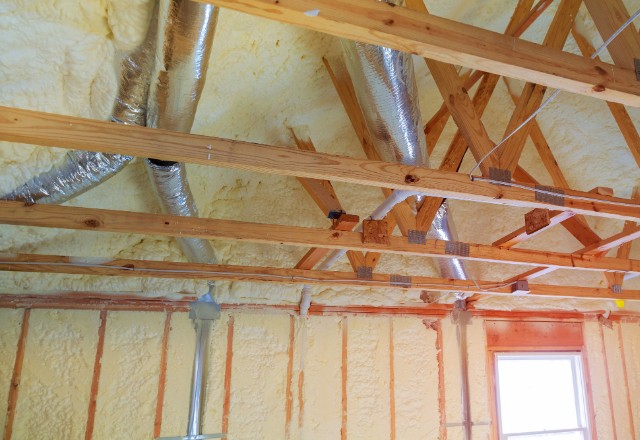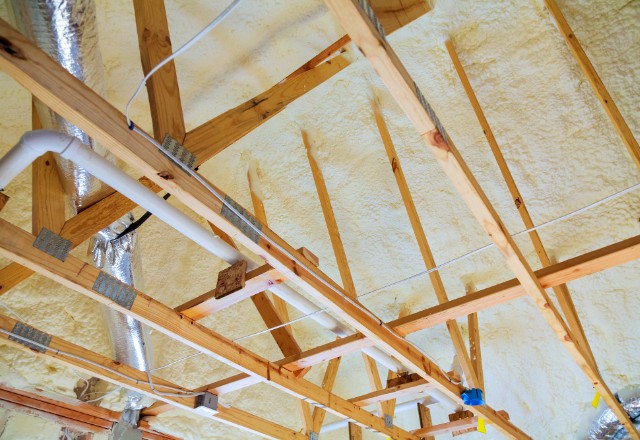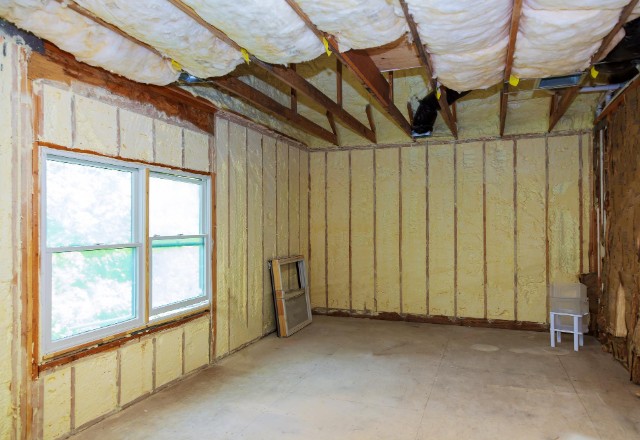Table of Contents
Are you considering spray foam insulation for your home or building and wondering, “How long does spray foam insulation last?” As insulation experts, we understand the importance of choosing an insulation material that provides long-lasting performance and value. In this article, we’ll explore the durability of spray foam insulation and the factors that influence its longevity.
Types of Spray Foam Insulation
Before diving into the question of how long does spray foam insulation last, let’s review the two main types of spray foam insulation:
| Type of Spray Foam Insulation | Characteristics | R-Value (per inch) | Typical Lifespan |
|---|---|---|---|
| Open-cell | – Lightweight and flexible | 3.6 – 3.8 | 50-80 years |
| – Excellent sound absorption and air sealing properties | |||
| Closed-cell | – Dense and rigid | 6.0 – 7.0 | 80-100 years or more |
| – Superior insulation and moisture barrier properties |
Both open-cell and closed-cell spray foam insulation offer exceptional durability and long-lasting performance when properly installed and maintained.

Factors Affecting the Longevity of Spray Foam Insulation
Several key factors influence the lifespan of spray foam insulation:
1. Quality of Installation
Proper installation is crucial to ensuring the longevity of spray foam insulation. When applied correctly, spray foam insulation adheres seamlessly to surfaces, creating an airtight and moisture-resistant seal. However, improper installation techniques can lead to gaps, voids, or uneven coverage, compromising the insulation’s effectiveness and durability.
At our company, we emphasize the importance of expert installation. Our skilled technicians undergo rigorous training and follow industry best practices to ensure optimal results. By investing in professional installation, you can maximize the lifespan of your spray foam insulation.
2. Environmental Factors
The environment in which spray foam insulation is installed can impact its longevity. Exposure to excessive moisture, high humidity, or extreme temperature fluctuations can degrade the insulation over time.
To mitigate these risks, it’s essential to address any moisture issues before installing spray foam insulation. Proper ventilation and moisture control measures, such as vapor barriers and adequate drainage, can help protect your insulation from environmental damage.
Here’s a table that illustrates the impact of various environmental factors on the lifespan of spray foam insulation:
| Environmental Factor | Impact on Spray Foam Insulation Lifespan | Severity |
|---|---|---|
| Moisture exposure | – Can cause degradation and loss of insulation properties – Promotes mold and mildew growth – Accelerates aging and deterioration | High |
| High humidity | – Increases the risk of moisture-related issues – Can lead to condensation within the insulation – Encourages mold and mildew growth | Moderate |
| Extreme temperatures | – Prolonged exposure to high temperatures can cause insulation to become brittle and crack – Rapid temperature fluctuations can lead to expansion and contraction, reducing insulation effectiveness | Moderate |
| UV radiation | – Prolonged exposure to direct sunlight can degrade the outer layer of the insulation – Can cause discoloration and surface deterioration | Low |
| Pest infestation | – Pests can burrow into the insulation, creating gaps and voids – Damage from pests can compromise the insulation’s effectiveness and longevity | Low |
3. Building Maintenance and Modifications
Regular building maintenance and any subsequent modifications can also affect the longevity of spray foam insulation. During renovations or remodeling projects, it’s crucial to protect the insulation from damage. Accidental punctures, tears, or compression can compromise the insulation’s effectiveness and shorten its lifespan.
If you’re planning any building modifications, consult with an insulation professional to assess the potential impact on your spray foam insulation. They can provide guidance on how to best protect your investment and maintain its long-term performance.

Comparison to Other Insulation Materials
When considering how long does spray foam insulation last, it’s helpful to compare its durability to other common insulation materials:
- Fiberglass insulation: Typically lasts 20-30 years
- Cellulose insulation: Typically lasts 20-30 years
- Rockwool insulation: Typically lasts 30-50 years
While these traditional insulation materials offer respectable lifespans, spray foam insulation stands out for its superior durability. With proper installation and maintenance, spray foam insulation can last 50-100 years or more, providing long-term value and energy savings for your home or building.
Signs of Aging or Deterioration
Despite its impressive durability, spray foam insulation can still experience aging or deterioration over time. It’s essential to be aware of the signs that your insulation may need attention:
- Visible cracks, gaps, or separation from surfaces
- Reduced energy efficiency or increased utility bills
- Drafts or temperature inconsistencies
- Moisture intrusion or signs of water damage
If you notice any of these issues, it’s crucial to address them promptly. Ignoring signs of aging or deterioration can lead to more extensive damage and compromise the overall effectiveness of your insulation.
Maintenance and Care
To maximize the lifespan of your spray foam insulation, regular maintenance and care are essential. Here are some best practices to follow:
- Schedule annual inspections: Have a professional insulation contractor assess your spray foam insulation yearly to identify any potential issues early on.
- Address moisture issues promptly: If you notice any signs of moisture intrusion or water damage, take immediate action to prevent further deterioration of your insulation.
- Protect insulation during renovations: If you’re undertaking any building modifications or renovations, work with your contractor to ensure proper protection measures are in place to safeguard your spray foam insulation.
- Avoid punctures or compression: Be cautious when storing items or performing maintenance tasks in insulated areas to prevent accidental damage to the spray foam insulation.
By following these maintenance and care guidelines, you can help ensure your spray foam insulation remains effective and durable for many years to come.

Professional Assistance
While spray foam insulation is renowned for its longevity, there may be instances where professional assistance is necessary. If you’re unsure about the condition of your insulation or suspect any issues, it’s always best to consult with an experienced insulation contractor.
A professional can thoroughly assess your insulation, identify any areas of concern, and recommend the most appropriate course of action. They can also provide valuable insights on how to best maintain your spray foam insulation and maximize its lifespan.
When selecting an insulation contractor, look for a reputable company with a proven track record of quality workmanship and customer satisfaction. At our company, we pride ourselves on our expertise, professionalism, and commitment to delivering long-lasting insulation solutions.
Conclusion
In conclusion, the answer to the question, “How long does spray foam insulation last?” is that with proper installation and maintenance, spray foam insulation can provide exceptional durability and long-term performance. Open-cell spray foam insulation typically lasts 50-80 years, while closed-cell spray foam insulation can last 80-100 years or more.
To maximize the longevity of your spray foam insulation, it’s crucial to invest in professional installation, address environmental factors, protect the insulation during building modifications, and adhere to regular maintenance and care practices.
By choosing spray foam insulation and following these guidelines, you can enjoy the benefits of a well-insulated, energy-efficient home or building for many years to come. If you have any concerns or questions about your insulation’s longevity, don’t hesitate to reach out to a professional insulation contractor for expert advice and assistance.



 509-201-4190
509-201-4190
